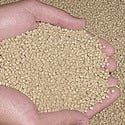January 12, 2010
|
Dynamic Modifiers' brand of thermoplastic olefins serves as a comparable, nontoxic replacement for PVC. |
Over the years, use of flexible PVC in such medical applications as IV bags and tubing has diminished, owing to its incorporation of potentially toxic phthalate plasticizers such as DEHP. In turn, polymer producers have offered up replacement options. And yet, these alternatives can drive up costs or do not truly offer all of the desirable functionality of flexible PVC, according to material compounder Dynamic Modifiers LLC. Recognizing the opportunity, the company has developed a thermoplastic olefin that it claims is the first price-competitive, functionally and aesthetically equivalent, nontoxic, flexible PVC alternative.
Because flexible PVC is a formulated polymer, the incorporation of various additives ultimately determines the flexibility and flame-retardant properties of the end material, explains Howard Bradshaw, company president. "There are so many different versions and variations [of flexible PVC]. You can literally go to a technical library and pick out formulations and say, 'I want a flexible PVC formulation that has these kinds of properties,' and you can actually look it up," Bradshaw says. "The same thing is not true with polyolefins. We've been able to take polyolefins and engineer them to truly give all of the different functional properties that you can get from flexible PVC. We're the only one making custom-engineered polyolefins [specifically] to replace flexible PVC for a variety of end-use applications."
Branded FlexOlé, the custom-engineered polyolefins are easy to process and are recyclable, in addition to being completely nontoxic and flame retardant. Furthermore, they do not consist of plasticizers that migrate to the surface. The engineered materials are also designed to exhibit a look and feel comparable to those of flexible PVC; but, the company maintains that customers have commented that the aesthetics of some versions of FlexOlé are actually superior.
Bradshaw emphasizes, however, that the strength of the brand is its customization capabilities. The compounds are available in any custom color, have a Shore hardness range from 50 up to 96, and can incorporate additives to enhance the product, such as making it antimicrobial. Moreover, with the recent release of the second generation of the product, the company has improved the price point by 20 to 25%, according to Bradshaw. This cost reduction puts the polyolefin at a comparable price point with flexible PVC, which he states has not been done before.
These improvements in customization and price compared with some alternatives on the market earned Dynamic Modifiers recognition at the 2009 R&D Awards in Orlando this past November. Although the material made its debut in sustainable window-treatment fabrics, the company asserts that it could potentially be used in a variety of medical applications, including tubing, hose, continuous positive airway pressure machines, and other medical equipment. Bradshaw notes, "Anywhere that flexible PVC is currently in use, FlexOlé has the potential to replace it."
Dynamic Modifiers LLC
Atlanta
www.flexole.com
You May Also Like



